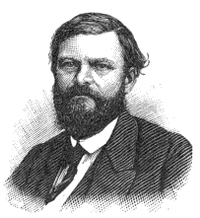Dewitt Clinton Senter
| Dewitt Clinton Senter | |
|---|---|
 |
|
| 18th Governor of Tennessee | |
|
In office February 25, 1869 – October 10, 1871 |
|
| Preceded by | William G. Brownlow |
| Succeeded by | John C. Brown |
| Speaker of the Tennessee Senate | |
|
In office 1867 – 1869 |
|
| Preceded by | Joshua B. Frierson |
| Succeeded by | Philip P.C. Nelson |
| Member of the Tennessee House of Representatives | |
|
In office 1855–1861 |
|
| Member of the Tennessee Senate | |
|
In office 1865–1869 |
|
| Personal details | |
| Born |
March 26, 1830 McMinn County, Tennessee |
| Died | June 14, 1898 (aged 68) Morristown, Tennessee |
| Resting place | Jarnagin Cemetery Morristown, Tennessee |
| Political party | Whig, Republican |
| Spouse(s) | Harriet T. Senter (1859) |
| Profession | Farmer |
| Religion | Methodist |
Dewitt Clinton Senter (March 26, 1830 – June 14, 1898) was an American politician who served as Governor of Tennessee from 1869 to 1871. He had previously served in the Tennessee House of Representatives (1855–1861), where he opposed secession on the eve of the Civil War. He was elected to the Tennessee Senate following the war, and was chosen as Speaker of the Senate in 1867. As speaker, he became governor upon the resignation of William G. Brownlow in 1869.
Senter is perhaps best remembered for undoing many of Brownlow's radical initiatives, most notably the restoring of the right to vote to former Confederates. The current Tennessee State Constitution was written and enacted during Senter's tenure.
Senter was born in McMinn County, Tennessee, the son of William Tandy Senter and Nancy White. His father was a popular Methodist minister and renowned orator who served in the United States House of Representatives in the mid-1840s, and was a delegate to Tennessee's 1834 constitutional convention. Dewitt grew up in what is now Hamblen County, Tennessee (then part of Grainger County), where he attended public schools. He studied at Strawberry Plains College in nearby Strawberry Plains from 1851 to 1852, and read law for about a year under Judge T.W. Turley.
Senter represented Grainger County in the state House of Representatives from 1855 to 1861. A Whig, he remained staunchly opposed to secession on the eve of the Civil War. In May 1861, he voted against the state's Ordinance of Secession, and canvassed in East Tennessee in an attempt to rally the region's Unionists. He was a member of the Grainger County delegation at the East Tennessee Convention, which sought to form a separate, Union-aligned state in East Tennessee. In 1862, Senter was arrested and jailed for several months by Confederate authorities. After his release, he fled to Louisville, Kentucky. He was an elector for the Republican Party ticket in the 1864 presidential election.
...
Wikipedia
